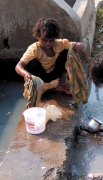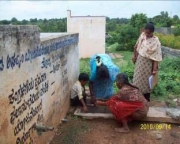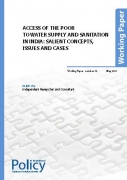/topics/sanitation
Sanitation
Rainfed areas and rice farming : Crucial agricultural water issues
Posted on 22 Nov, 2014 10:30 AMJohn Thompson works on power, policy and sustainability issues in food and agriculture, water resource management and rural development. He is a STEPS Centre member, IDS Fellow and joint Co-ordinator of the Future Agricultures Consortium. He presents two crucial agricultural water issues to take priority on World Water Day.
The economic impacts of inadequate sanitation in India Rs 24 Trillion equivalent of 64 per cent of GDP A report by WSP
Posted on 22 Nov, 2014 10:30 AM This study report by the Water and Sanitation Programme (WSP), a global partnership administered by the World Bank suggests that inadequate sanitation causes India considerable economic losses, equivalent to 6.4 per cent of India's GDP in 2006 at Rs. 2.4 Trillion. It analyzed the evidence on the adverse economic impacts of inadequate sanitation, which include costs associated with death and disease, accessing and treating water, and losses in education, productivity, time, and tourism. The findings are based on 2006 figures, although a similar magnitude of losses is likely in later years.
This study report by the Water and Sanitation Programme (WSP), a global partnership administered by the World Bank suggests that inadequate sanitation causes India considerable economic losses, equivalent to 6.4 per cent of India's GDP in 2006 at Rs. 2.4 Trillion. It analyzed the evidence on the adverse economic impacts of inadequate sanitation, which include costs associated with death and disease, accessing and treating water, and losses in education, productivity, time, and tourism. The findings are based on 2006 figures, although a similar magnitude of losses is likely in later years.
The study focused on the safe management of human excreta and associated hygiene behavior. The methodology adopted by the study included disaggregating the economic impacts of inadequate sanitation into health-related impacts including premature deaths, costs of treating diseases, and productive time lost due to illnesses; domestic water-related impacts including household treatment of water, and money and time costs to obtain safe water; welfare losses including additional time spent by people for accessing toilets or open defecation sites, and girls having to miss school, and women not going to work; and the loss of potential tourism owing to inadequate sanitation.
Data on incidence (e.g. diarrheal diseases, deaths, etc.) were compiled from national sources (National Family Health Survey, WHO Demographic and Health Surveys, and other Govt. of India sources). Based on scientific literature, attribution factors were used to estimate the populations impacted by inadequate sanitation. Economic valuation was carried out using costs/prices based on secondary studies.
{C}
Benefits issues and status of WATSAN systems A survey of an IDWM project supported by Arghyam
Posted on 22 Nov, 2014 10:30 AM This paper presents the results of a survey of WATSAN systems implemented under an Integrated Domestic Water Management (IDWM) project supported by Arghyam and implemented by MYRADA and MYKAPS in Bangarpet and H D Kote blocks of Kolar district of Karnataka. Arghyam has promoted Roof-top Rain Water Harvesting (RRWH) and eco-sanitation systems in its various project areas through its partner organizations.
This paper presents the results of a survey of WATSAN systems implemented under an Integrated Domestic Water Management (IDWM) project supported by Arghyam and implemented by MYRADA and MYKAPS in Bangarpet and H D Kote blocks of Kolar district of Karnataka. Arghyam has promoted Roof-top Rain Water Harvesting (RRWH) and eco-sanitation systems in its various project areas through its partner organizations.
This project aimed at developing an integrated approach to domestic water management. It focused on construction of RRWH and eco-sanitation toilets in four villages in the project area in Kolar with the aim of creating models of integrated management of domestic water and sanitation in a rural set-up.
Access of the poor to water supply and sanitation in India Salient concepts issues and cases by the International Policy Centre for Inclusive Growth
Posted on 22 Nov, 2014 10:30 AM This paper by the International Policy Centre for Inclusive Growth deals with access of the poor to water supply and sanitation in India. It argues that economic, technical, institutional as well as social factors constrain access to safe drinking water and proper sanitation in India for both the urban and rural poor, and that coverage figures do not reflect this restricted access. It finds that, increasingly, communities are being required to manage their own water and sanitation schemes, not just in rural areas but in urban ones as well.
This paper by the International Policy Centre for Inclusive Growth deals with access of the poor to water supply and sanitation in India. It argues that economic, technical, institutional as well as social factors constrain access to safe drinking water and proper sanitation in India for both the urban and rural poor, and that coverage figures do not reflect this restricted access. It finds that, increasingly, communities are being required to manage their own water and sanitation schemes, not just in rural areas but in urban ones as well.
The paper deals with domestic water supply and sanitation and presents a historical overview of the phenomenon in rural and urban India. This is followed by a critique of available figures for coverage which, it is contended, seem exaggerated because they do not account for the several constraints to access. It addresses the specific institutional problems faced in the public sector delivery of these two utilities in India apart from dealing with the parallel yet thus far limited presence of the private sector in these twin arenas.
Mining: An increasing threat to our rivers. Article by Nitya Jacob
Posted on 22 Nov, 2014 10:30 AMContent Courtesy: Solution Exchange and Nitya Jacob
Author: Nitya Jacob
India’s arteries are choking. Her rivers, the lifeline of hundreds of millions, are over-taxed, polluted and encroached. They are being mined, dammed and emptied of water. Save for the four monsoon months, most rivers are streams of drains, depending on how many cities they pass through. This year people gaped in awe at the River Yamuna (I am sure they were over-awed by other rivers elsewhere too) as for the first time since 1978 looked like a river and not a drain.
Transdisciplinary method for water pollution and human health research : A working paper by Peter Mollinga
Posted on 22 Nov, 2014 10:30 AMThis paper discusses how to go about designing an interdisciplinary or transdisciplinary research project or programme, with ZEF’s research initiative on ‘water pollution and human health’ in India as the background of the presentation. A summary is given of Pohl and Hirsch Hadorn’s main arguments regarding ‘design principles’ for inter- and transdisciplinary research, and the basic tools they have developed for this are discussed in the context of ZEF’s ‘water pollution and human health’ research initiative.
Preparation of City Sanitation Plans for select cities in India : Consultation workshop organised by MoUD MoEF and GTZASEM April 2010
Posted on 22 Nov, 2014 10:30 AMA two day workshop was conducted on 15-16 April 2010 at Bangalore by GTZ-ASEM and supported by the Ministry of Urban Development (MoUD) and the Ministry of Environment and Forests (MoEF) regarding preparation of City Sanitation Plans.
The Ministry of Urban Development (MoUD) has undertaken the preparation of the City Sanitation Plans (CSPs) under the National Urban Sanitation Policy (NUSP) since the year 2008.
An introduction to sanitation technologies: Video from Water for People
Posted on 22 Nov, 2014 10:30 AMWe often get asked about toilets— what is the difference between a VIP and an improved pit latrine? What is the actual technology that supports Ecological Sanitation? Good questions, and so we are introducing short videos on different types of toilets.
Misguided debate continues to shape sanitation crisis
Posted on 22 Nov, 2014 10:30 AMA study is now circulating about how more people in India have access to cell phones than latrines. This lit up the blogosphere and Twitter – sector professionals and advocates are both dumbfounded and outraged that something so central to health and development as a toilet is being numerically lapped by something so trivial/consumerist as a cell phone. This affront has led to yet further calls for "action": more money for toilets and greater commitments to sanitation provision from aid agencies, governments, and NGOs who too often prioritize water over sanitation.
The global water tool by the World Business Council for Sustainable Development WBCSD
Posted on 22 Nov, 2014 10:30 AMThe WBCSD's Global Water Tool, launched at World Water Week 2007 in Stockholm and updated in 2009 for the





